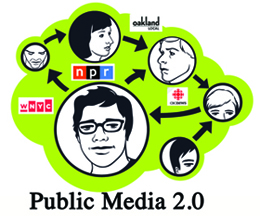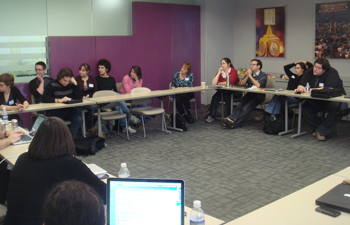The Public Media 2.0 series on MediaShift is sponsored by American University’s Center for Social Media (CSM) through a grant from the Ford Foundation. Learn more about CSM’s research on emerging public media trends and standards at futureofpublicmedia.net.
The last few months have been a bumpy stretch for public media. Due to controversial editorial decisions at both NPR and PBS, these organizations have gone from just covering the news to being the focus of it as well.

NPR has faced withering criticism from the right for its seemingly abrupt firing of news analyst Juan Williams. The local Mississippi Public Broadcasting affiliate received similar criticism from the left after it dropped the popular national show Fresh Air from its line-up due to what it viewed as inappropriate sexually explicit conversation. And PBS came under fire for cutting controversial comments Tina Fey made about Tea Party-favorite Sarah Palin from its broadcast of the Mark Twain Prize ceremony, supposedly due to time constraints.
While each of these firestorms was put out by the institution that created the controversy, the second annual National Public Media Camp, which wrapped up Sunday night at American University (AU) in Washington, D.C., provided an opportunity for representatives from all three organizations to share their experiences and — more importantly — the lessons learned. Not surprisingly, the session entitled “How to handle an online revolt” was one of the many highlights of a packed weekend of diverse discussions.
NPR social media strategist Andy Carvin’s talk about the Williams incident combined his first-hand knowledge of managing a social media disaster with that of Thomas Broadus” from the Mississippi radio communications team and PBS’ director of digital communications Kevin Dando. Broadus’s former boss, who has since resigned, provided a casebook study of how not to respond to an angry Internet: ignore the web at your own peril.
Carvin thanked his lucky stars that he had the good fortune to hire a comment moderating firm only weeks before NPR’s home page was hit by more than 10,000 comments a day in the immediate aftermath of Williams’ dismissal. Dando, whose preemptive plan to host Tina Fey’s full speech online muted the conservative outcry, told the audience that even PBS.org got angry, misguided comments denouncing the television service for firing Juan Williams (even though that was really done by NPR not PBS).
“When you have an online conflagration, you’re probably better off letting users vent,” observed Jon Gordon, the social media director of Minnesota Public Radio (MPR), after the discussion. “That is the independent conclusion reached by all three of those people who talked about online revolts. To me, that was the value of that session.”
How it Worked
“The goal of PubCamp,” said Carvin, “is to create an informal but high energy environment where members of the public with certain skills to bear can come and work with public media staff to find ways to collaborate with each other.”
PubCamp organizers Carvin, PBS product manager Jonathan Coffman, iStrategyLabs founder Peter Corbett, and MediaShift corespondent Jessica Clark employed a freewheeling, unconference format to facilitate this interaction. Each morning, all of the station managers, fundraisers, and web developers — as well as the larger group of public media enthusiasts in attendance from non-profits, the press, and tech community — gathered in the large conference room provided by AU and shared ideas for sessions and discussions over coffee and bagels.

“The entire success or failure of the event is based on what attendees are willing to propose in that first hour,” Carvin explained. “That puts enough pressure on the people who come to put some thought into it and to do something constructive and interesting.”
The 160 or so participants, some of whom came from as far away as Brazil and Japan, were not lacking for ideas. Out of this participatory process came informational sessions like “Metadata best practices,” big idea talks like “How does public media respond to the culture wars?” as well as technical discussions about the Android mobile platform in “Collaborating with Google.”
While nominally guided by the person or team who proposed the topic, sessions were similarly reliant on the input of the attendees. For example, MPR’s Gordon led a talk about effective use of social media on Saturday afternoon.
“I proposed that session not because I really had the answer but because I have questions to ask of the community here,” said Gordon, who took over as the social media and mobile editor at MPR News earlier this year. There was enough interest that a second social media discussion was staged on Sunday morning.
Gordon attended his first public media unconference in St. Paul in 2008. This community engagement and brainstorming event, as well as another staged by Santa Cruz public radio station KUSP, helped inspire the first National PubCamp and a dozen other local PubCamps last year.
How it Succeeded

Many first-time attendees found the unconference process somewhat bewildering, but everyone I spoke with seemed happy with the discussion it produced.
E-Democracy.org executive director Steven Clift, another Minnesotan who was among the third of conference-goers who were not public media employees, made the trip primarily “to meet the people in the online side of public media,” he said.
Clift also used his first PubCamp experience to discuss a pet issue he’s passionate about: improving the quality of online news commenting by reducing user anonymity. “Local newspapers are fundamentally undermining their democratic mission — and their brands — by hosting poor quality commenting,” he said.
NPR mobile operations manager Jeremy Pennycook was excited to meet Michael Frederick, a software engineer at Google who NPR CEO Vivian Schiller described as “a celebrity” in her welcome speech at the opening plenary.
“It’s always great to develop relationships with people who are in your field but aren’t doing what you’re doing,” Pennycook said. “It’s my job to go between people like Michael Frederick who are knee deep in code and people who are content producers or making decisions about media at the executive level.”
Although Frederick’s primary job is programming Google Docs, he used the 20 percent of time his company sets aside for creative ventures to work with Pennycook building the much beloved NPR Android mobile app.
How it Aims to Change Public Media
Carvin hopes future PubCamps will lay the groundwork for more open source collaborations like the one between Pennycook and Frederick. Carvin said he wants PubCamp to become a “movement,” and noted that his primary complaint about the first full year of the organization was that it had not produced more technical advances.
“One thing that I wanted to see happen at more of at the PubCamps we did this summer was more people writing code,” he said.
To foster innovation at the national PubCamp, the organizers set up a separate room stocked with food and plenty of coffee for developers. The “Dev Lounge” produced one tangible result: A WordPress plug-in that will allow users to edit, excerpt, or fully republish NPR stories. Two other projects — an SMS polling platform and a trackback system for quotes — were also in the works.
But the most lasting result may be the connections formed in the Dev Lounge — and indeed within the PubCamp as a whole. At the closing plenary, the coders announced they were forming a Google Group to float new ideas and keep in touch. As Amy Wielunski, a membership manager working on fundraising for dual licensed PBS/NPR station WSKG in Binghamton, N.Y., pointed out, “just the fact that we’re having these conversations is a huge step forward.”
“Why would I have ever had a reason to interact with Andy Carvin before?” asked Wielunski, who spoke up at the online revolt session about the increase in residual donations that the Juan Williams incident produced at her station after the latest membership drive.
“I wouldn’t,” she said.
*****
What did you think of the National PubCamp? If you weren’t able to attend, what did you think of the event coverage on Twitter and NPR? Would you attend a future PubCamp? Leave your thoughts in the comments section.
Photo of Jay Rosen by Julia Schrenkler via Flickr
Corbin Hiar is the DC-based associate editor at MediaShift and climate blogger for UN Dispatch and the Huffington Post. He is a regular contributor to More Intelligent Life, an online arts and culture publication of the Economist Group, and has also written about environmental issues on Economist.com and the website of the New Republic. Before Corbin moved to the Capital to join the Ben Bagdikian Fellowship Program at Mother Jones, he worked a web internship at the Nation in New York City. Follow him on Twitter @CorbinHiar

